Note
Hello, I hope your family is doing well! I have a question: are there resources on the web for learning mandarin dialects? I've been trying to learn my native dialect (wuhanese) but my mom forgot most of it because she's been in the US for so long...
Hello! Thank you for asking!
Unfortunately, consistent resources for dialects like these are very scarce.
This is where I would encourage you to reach out to family members, their friends, etc, or even making a public post somewhere asking if someone knows how to speak this dialect. You could also try searching around on Instagram. (I know, that sounds kind of random), but there are plenty of Chinese people on Instagram who are teaching Chinese to their followers, and one of them is bound to know something about Wuhanese and would be happy to teach it to you. Overall, surrounding yourself with people who know the dialect and daily reinforcement is the best way to learn.
In terms of western sources, here's what I found, (but they are not consistent programs that you are able to practice/build up on your knowledge):
https://app.memrise.com/course/148833/basic-wuhan-dialect/
https://www.youtube.com/watch?v=bfJ9LrTDvcI
https://www.youtube.com/watch?v=zvjy-MVAW_0
https://www.youtube.com/watch?v=1FZTgtBsQ2M
https://www.theworldofchinese.com/2018/09/fangyan-friday-1-wuhanese/
https://wiki2.org/en/Wuhan_dialect
https://www.froginawell.net/frog/2020/03/the-language-of-wuhan/
In terms of Chinese sources, I will personally look around, but I do suggest looking on BiliBili (which is basically Chinese YouTube - it's available in the US). Type in 武汉话 or 武汉方言 into the search bar, and that might take you somewhere.
I'm really sorry that this is all I can do for you right now, but I'll be sure to come back with an update!
22 notes
·
View notes
Text
Some people are so TONE DEAF.
I just made a post talking about where I’ve been which included a small part about how my family faced discrimination coming to the US.
Someone left a reply where they stated that they were American and apologized for the racist people in the US. While I appreciate that, THIS SAME PERSON’S BLOG IS CENTERED AROUND ASIAN FETISHISM WHERE THEY LITERALLY ONLY REBLOG PICTURES OF NAKED ASIAN WOMEN.
HOW ARE YOU GOING TO APOLOGIZE FOR PEOPLE’S RACIST BEHAVIOR AND THEN GO ON ABOUT YOUR DAY ALSO PARTAKING IN DISRESPECTFUL/RACIST BEHAVIOR?!
And don’t say BS like “I’m into the culture.” No you’re not. You do the bare minimum and learn barely anything about another person’s culture and just want to have sex with the women. You treat having sex with an “exotic” woman the main course while you use the culture as something extra, fun, and something you can benefit off of.
Your behavior is hypocritical, and it is racist/disrespectful.
27 notes
·
View notes
Text
Where have I been?
大家好!
I have received many asks and messages asking me where I've been recently. I promised a lot of new content but have been absent for months now.
I am still recuperating from helping my family move to the US. It took a long time to help them get settled, and I am still helping them nearly everyday with their daily life. Unfortunately, they faced some discrimination, and in one occurrence, I truly believe they have a good case to sue, so I have been helping them with that.
I also spent time relearning things and expanding my knowledge about Chinese culture (and similar things) to share with you. Most of my time spent, however, was on building a career path for myself.
I plan to return soon with more content as well as respond to messages/asks. If you have any questions, suggestions, etc, please reach out to me.
*Also: Many people asked me if I have an Instagram because there are accounts with similar usernames to mine. As of right now, I do not have an Instagram! I don’t know if someone is claiming to be me or not, but my username isn’t that rare, so just be careful anyways.
I hope you all have a wonderful day. 再见!
20 notes
·
View notes
Text
wtf no green onion emoji.. world has gone to shit
11K notes
·
View notes
Photo
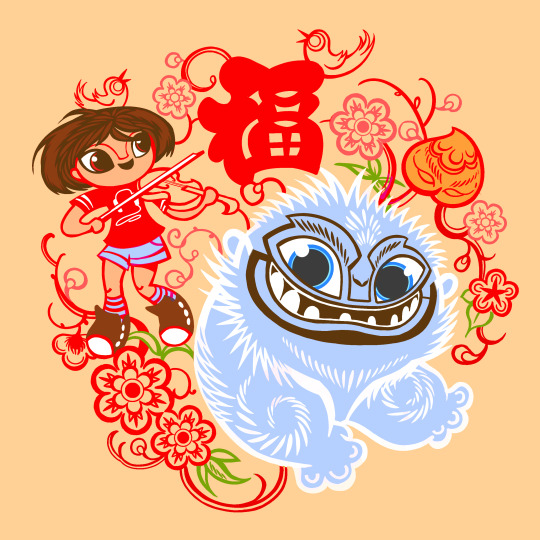
Happy Lunar New Year from Yi and Everest! 🐂🎆🎉🧧
🎨: @christinebiandraws/Instagram
4K notes
·
View notes
Text
So tired of seeing beautiful artwork, creative video ideas, new make-up looks, designs, etc being done by non-Korean Asians and then all the Kpop fans tag it as “Korean style, Korean aesthetic” or something like that.
Please stop erasing the ideas, successes, hard work, and cultures of other Asians. Other Asian cultures are so beautiful and so unique - and with all the racism going on right now - these people work so hard trying to share their ideas and passions, and doing this erases the value of these cultures and makes it seem like something has to be Korean in order to be considered beautiful, unique, and valued.
#asian#racism#kpop#korean#langblr#please correct me if my views are incorrect on this#i'm just tired of seeing this#and this is just based on my experience#there's nothing wrong with liking kpop#just make sure the information is accurate when you share something online
55 notes
·
View notes
Photo
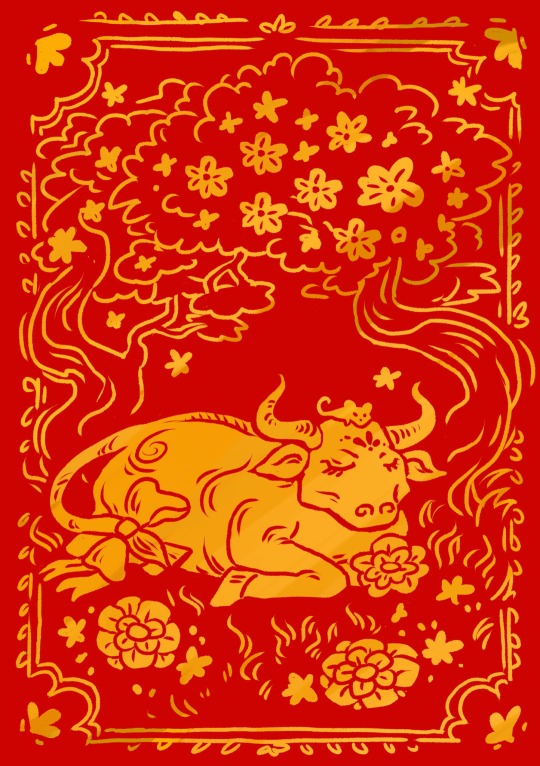

Happy Year of the Ox!
20K notes
·
View notes
Text
*Also note that this blog is centered around Chinese culture and language, therefore I will describe things how China does them. That being said, this post describes what is common for people in China to do, which is why I refer to this holiday as Chinese New Year. However, many people from different cultures and countries celebrate this holiday and have different variations for how they celebrate, so calling this holiday “Lunar New Year” is more inclusive. Thanks!
Chinese New Year! 新年快乐!
*please note that the information below isn’t celebrated by everyone in the same way. Some customs are more common in northern China rather than southern China and vice-versa.
How to wish someone a Happy Chinese New Year:
1. 新年快乐!Xīnnián kuàilè! - Happy New Year! (This can be used one the first day of the lunar calendar as well as the Gregorian calendar).
2. 新春快乐!Xīnchūn kuàilè! - Happy Spring Festival!
3. 新年好!Xīnnián hǎo! - Hello! (This is how you greet people during Chinese New Year).
When greeting or wishing someone a Happy Chinese New Year, many Chinese people wish their family and friends things like: “I hope you have a happy and healthy family,” “I hope you get a job promotion,” “I hope you have good fortune and pockets overflowing with gold.” Here are some examples:
4. 恭喜发财!Gōngxǐ fācái! - Wish you a successful and prosperous year! (This saying is known well because of this Chinese New Year song you can watch here).
5. 阖家幸福! Hé jiā xìngfú - Wish you a happy family!
6. 事业有成! Shìyè yǒu chéng - Hope you have a successful career!
You can watch this YouTube video or read this article to learn more about how to wish someone a Happy Chinese New Year!
🧧🧧🧧🧧🧧🧧🧧🧧🧧🧧🧧
What is Chinese New Year?
Chinese New Year, also known as lunar new year or the spring festival, celebrates the first day of the new year on the lunar calendar. In 2021, this holiday falls on Friday, February 12! This holiday is the most important holiday to those who celebrate this - its importance can be comparable to how Americans celebrate Christmas.
People have been celebrating Chinese New Year for about 3,500 - 3,900 years. It’s exact origins are unknown, but this tradition is believed to have started in the Shang Dynasty (1600-1049 BC) when people would make sacrifices to the gods and their ancestors towards the end of a year. However, the tradition was recorded and official during the Han Dynasty (202 BC - 220 AD) when Emperor Wu began using the lunar calendar. He chose to follow this calendar because it would let him know when second new moon after the winter solstice was.
Now, many Southeast Asian countries and people besides the Chinese celebrate Chinese New Year such as: Koreans, Vietnamese, Tibetans, etc. However, it is common to not see Japan celebrate Chinese New Year.
🐮🐮🐮🐮🐮🐮🐮🐮🐮🐮🐮🐮
Why do I keep hearing about the Year of the Ox/Cow?
Just like in western culture, there are zodiacs in eastern culture that the Chinese follow. There are 12 zodiacs, and these zodiacs follow a cycle of 12 years. Each new year represents one of the zodiacs.
In order, they are: Rat/mouse, Ox/cow, Tiger, Rabbit, Dragon, Snake, Horse, Sheep, Monkey, Rooster, Dog, and Pig.
2021 is year of the Ox/Cow - 2020 was year of the Rat/Mouse - 2019 was Year of the Pig… and so on.
Because each zodiac has its own characteristics, they define a year. Chinese zodiac scholars have said in 2021, Year of the Ox, will be a flip-around positive change. They believe this year will be lucky and that it will be a good time to focus on love and relationships. People who are born in years of the Ox are known to have a lot of endurance, be calm and confident, but are also stubborn.
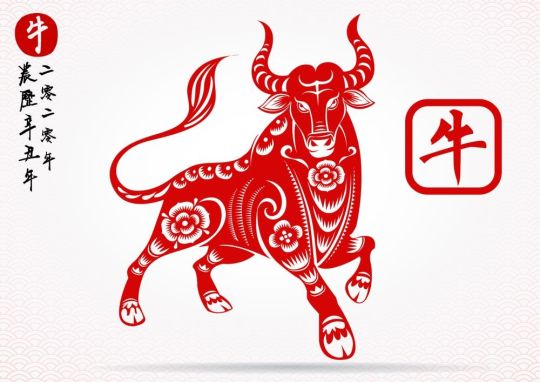
Just like in western culture, these zodiacs are believed to affect personality, fortune, etc, and instead of getting your zodiac by your birth month, you get your zodiac by your birth year. If you are interested in your Chinese zodiac, you can type in your birthday on this calculator and read about it.
🏮🏮🏮🏮🏮🏮🏮🏮🏮🏮🏮🏮🏮
What happens during Chinese New Year and how long do you celebrate it for? Lantern Festival?
On average, Chinese New Year is celebrated for about 15-16 days (from about New Year’s eve to the first full moon). Preparations start seven days before New Years because stores and restaurants close and people travel to be with their families. Most students are also on their big break during this time - they get off from school around the beginning of january and go back after Chinese New Year. It should also be noted that Northern China and Southern China celebrate the new year differently.
During the preparation period, people go shopping for food and decorations. They also clean the house very well. If living in a different city than one’s family, many people will travel back to their hometown to celebrate with family.
During the New Year’s Eve period, the house is decorated with New Year’s decorations, and there is a reunion dinner with family at the host’s house. Out of all the dinners you have during the year, it is incredibly important you don’t miss this dinner, which is why there are so many issues with travelling during this time. At this dinner, you eat many lucky foods such as dumplings and fish. Also during this time, the older generations will give younger generations something called 红包, which translates to “red envelope.” These envelopes are filled with money and are only given on very special occasions such as new years and weddings. Friends give these to each other, but it is not common at all for a younger generation to give one to an older generation person. There is a custom where families stay up late to “watch over the new year,” which is called 守岁. Late at night, people also like to go to temples to hear the first bells of the new year ring because they believe it will drive away bad luck.
On Chinese New Year’s Day, fireworks go off, families cook and eat large meals together, sacrifices are made to ancestors, etc. (Fireworks are especially important because they believe it will make your business more successful.) One popular tradition you might know of is the dancing lion/dragon parades where people wear a dragon costume and parade through the city. Dragons are very representative of Chinese culture and are thought to bring luck to a community. Lions are a symbol of protection.
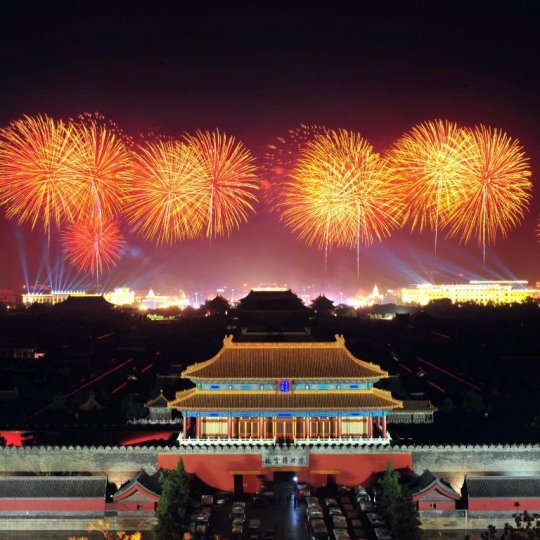
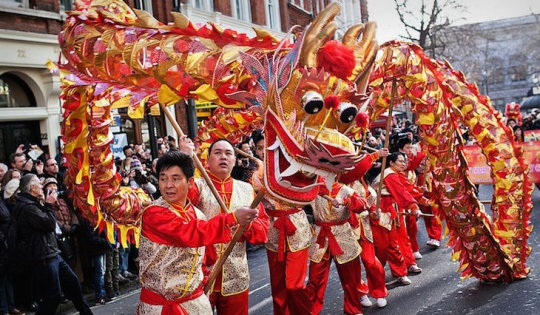
For about a week after the first day, most people go visit family and friends. A lot of times people will visit the other side of their family. For example, someone will spend most of the time with their mother’s side of the family during the new year, then during this week, they will go visit relatives of the father’s side.
After that week, most people go back to work. This is around day 8-10. Businesses, restaurants, and stores reopen, and many people leave their hometown to go back to jobs in the city.
Day 15, the final day of Chinese New Year, is the Lantern Festival. On this day, the first full moon of the new year happens. To celebrate, people will light more fireworks, revisit family, eat sweet dumplings (called tangyuan), and participate in the Lantern Festival. People release lit lanterns into the sky to honor dead ancestors. This is called 元宵节.
You can read more here.
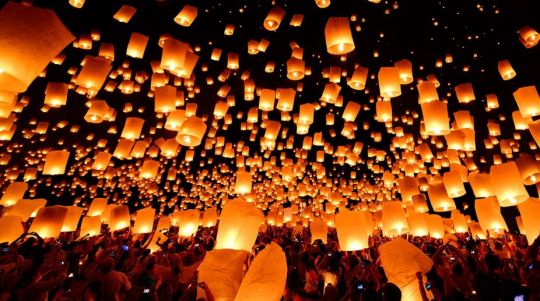
🥟🥟🥟🥟🥟🥟🥟🥟🥟🥟🥟🥟🥟
What foods are eaten during Chinese New Year, and what do they represent?
During Chinese New Year, many special foods are eaten, and these are foods that are considered to be lucky and to bring fortune into the new year.
1. Dumplings - represent wealth. Dumplings take hours to make and involve family help. They’ve been eaten for at least 1,800 years and are especially popular in northern China. It is said that the more dumplings you eat during the new year, the more money you will make.
2. Fish - represents prosperity and success. The word “fish” in Chinese sounds like the word “surplus” in Chinese.
3. Glutinous Rice Cake/Nian gao - represents success in your work (more money, better position).
4. Spring rolls - represent wealth. They get their name because they are most often eaten during the Spring Festival which is CNY. This dish is more popular in eastern and southern China.
5. Oranges, tangerines - represents luck and fortune. This is originally a Cantonese custom, but many people grace their tables with citrus fruits. The word for “tangerine” sounds similar to the word for “good fortune” in Chinese.
6. Longevity noodles - represents longevity. These noodles are longer than usual to represent a person’s long and happy life. This is more commonly eaten in northern China. *It should be noted that these are mostly eaten on birthdays but can be eaten during the NY as well.
7. Sweet rice balls/tang yuan - togetherness in family. This food is eaten during the Lantern Festival, the last day of Chinese New Year. The shape and pronunciation is associated with closeness of the family.
8. Snacks - represent a sweet and pleasant life. Any sweet snack like dried fruit, candy, tanghulu is eaten during this time.
When it comes to food during Chinese New Year, there are superstitions about how foods should be prepared and what makes them lucky. You can read more about them here as well as here.
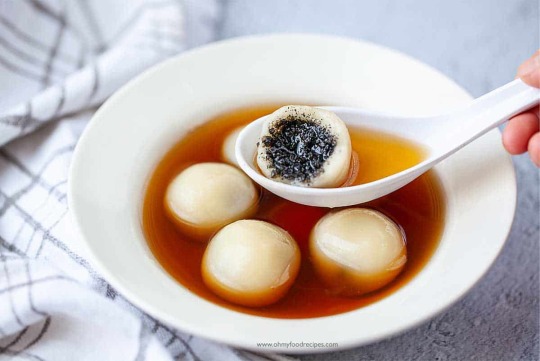
🎇🎇🎇🎇🎇🎇🎇🎇🎇🎇🎇🎇🎇
What kinds of decorations are put up in houses during the new year? What do the colors represent?
1. Spring/door couplets - These couplets originated in the Shu era. As seen in the picture below, you post these on doors in couples - in Chinese culture, even numbers are seen as good luck. On many of these couplets are written wishes or poems for the new year. Each couplet should have the same rhythm and the same number of words.
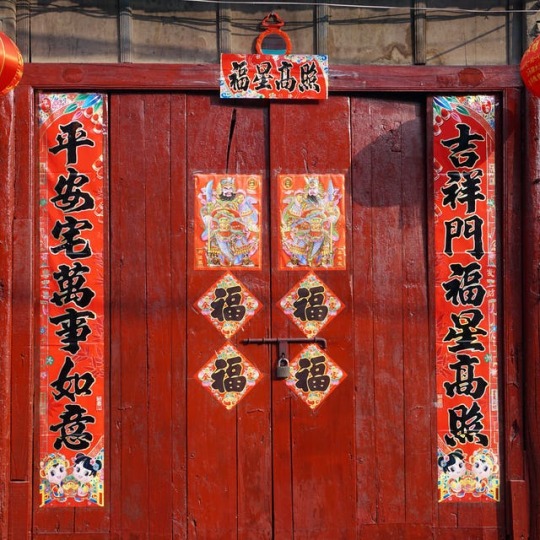
2. Paper cutting - Translated as “window flower,” these intricate, red paper cutting pieces are placed on windows and often represent the zodiac of the new year or other symbolic animals such as fish, dragons, and phoenixes.
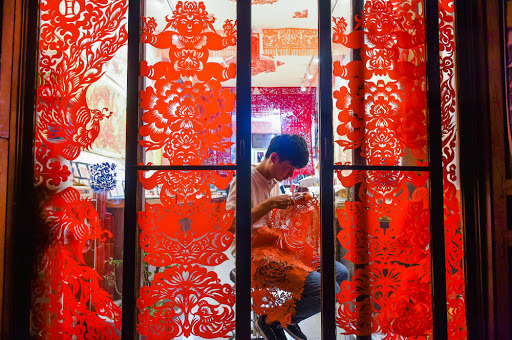
3. Upside down characters/Fortune - Many Chinese people during the new year hang up positive characters such as Fu, which means happiness and good fortune. It is written in calligraphy on a red piece of paper and then put upside down on doors and windows. It is hung upside down because the people want the good fortune to fall down onto them.
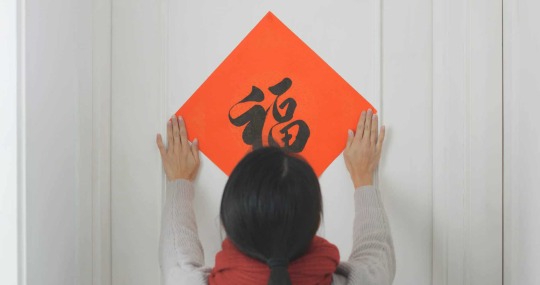
4. Red lanterns - These lanterns push away bad luck and are seen during both the Spring and Autumn Festival. They can be hung on trees, outside houses, etc. There are also many styles - they can come in many shapes and have symbols written on them.
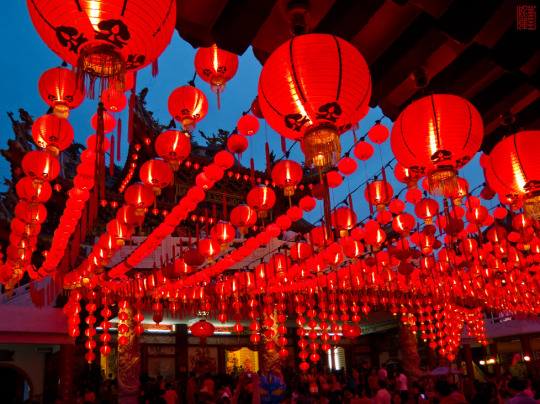
5. Kumquat trees - As said before, citruses represent good luck and fortune. People place kumquats and citrus fruits on their tables or decorate their homes with small kumquat trees.
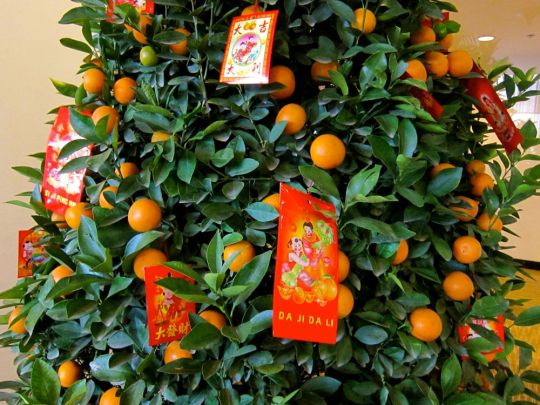
You can read more about decorations here as well as here.
Common colors seen during Chinese New Year are red and gold, but green can also be found.
The color red is not only dominate during Chinese New Year, but it is also very representative of Chinese culture as well. Red signifies fire, good fortune, and happiness. It is representative of good luck, keeps the holiday very joyous, and scares away bad spirits.
Gold or yellow is considered to be a very beautiful color. Gold symbolizes wealth, riches, and prosperity.
Green represents money, harmony, and growth.
Though these are the most common colors, it should be noted that a color combination of green and red is considered to be tacky in Chinese culture.
🍊🍊🍊🍊🍊🍊🍊🍊🍊🍊🍊🍊🍊🍊
What do people wear during Chinese New Year?
On the first day, it is traditional to wear new clothes and new accessories as it symbolizes new beginnings. However, there are people who like to wear sentimental accessories to respect and remember their ancestors.
Some people like to wear traditional Qipao/Cheongsam, Tang Suits, and Hanfu, but many people stick to western clothes like skirts, dresses, and pants. There is also a tradition of wearing lucky, red underwear for New Years.
Tang suits are the most popular to wear during the New Year, Qipao is also popular, but it is often too cold to wear during the winter months. Many people are starting to wear Hanfu again to celebrate the new year, but it isn’t widely accepted yet to wear during the new year.
During the new year, people wear a lot of red and gold. It is important to NOT wear mostly white and/or black. These symbolize death, and white is worn at funerals. Anything that is bright, bold, and upbeat should be fine to wear, but you should go for something that is red.
*If you want to wear something that is traditional Chinese for New Years, please make sure you know about cultural appropriation and know how to wear these properly.
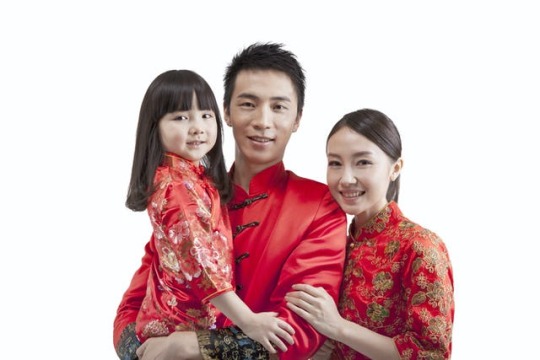
🐉🐉🐉🐉🐉🐉🐉🐉🐉🐉🐉🐉🐉
As there is so much information about Chinese New Year, I cannot possibly tell you all about it in one post. It is truly something that you must experience in your lifetime. It is very beautiful, fun, and there are so many things to do and celebrate. I ask you that you please research this more and look at all the beautiful pictures of food, lanterns, fireworks, etc.
Please stay safe and 新年快乐!
4K notes
·
View notes
Text
Chinese New Year! 新年快乐!
*please note that the information below isn’t celebrated by everyone in the same way. Some customs are more common in northern China rather than southern China and vice-versa.
How to wish someone a Happy Chinese New Year:
1. 新年快乐!Xīnnián kuàilè! - Happy New Year! (This can be used one the first day of the lunar calendar as well as the Gregorian calendar).
2. 新春快乐!Xīnchūn kuàilè! - Happy Spring Festival!
3. 新年好!Xīnnián hǎo! - Hello! (This is how you greet people during Chinese New Year).
When greeting or wishing someone a Happy Chinese New Year, many Chinese people wish their family and friends things like: “I hope you have a happy and healthy family,” “I hope you get a job promotion,” “I hope you have good fortune and pockets overflowing with gold.” Here are some examples:
4. 恭喜发财!Gōngxǐ fācái! - Wish you a successful and prosperous year! (This saying is known well because of this Chinese New Year song you can watch here).
5. 阖家幸福! Hé jiā xìngfú - Wish you a happy family!
6. 事业有成! Shìyè yǒu chéng - Hope you have a successful career!
You can watch this YouTube video or read this article to learn more about how to wish someone a Happy Chinese New Year!
🧧🧧🧧🧧🧧🧧🧧🧧🧧🧧🧧
What is Chinese New Year?
Chinese New Year, also known as lunar new year or the spring festival, celebrates the first day of the new year on the lunar calendar. In 2021, this holiday falls on Friday, February 12! This holiday is the most important holiday to those who celebrate this - its importance can be comparable to how Americans celebrate Christmas.
People have been celebrating Chinese New Year for about 3,500 - 3,900 years. It’s exact origins are unknown, but this tradition is believed to have started in the Shang Dynasty (1600-1049 BC) when people would make sacrifices to the gods and their ancestors towards the end of a year. However, the tradition was recorded and official during the Han Dynasty (202 BC - 220 AD) when Emperor Wu began using the lunar calendar. He chose to follow this calendar because it would let him know when second new moon after the winter solstice was.
Now, many Southeast Asian countries and people besides the Chinese celebrate Chinese New Year such as: Koreans, Vietnamese, Tibetans, etc. However, it is common to not see Japan celebrate Chinese New Year.
🐮🐮🐮🐮🐮🐮🐮🐮🐮🐮🐮🐮
Why do I keep hearing about the Year of the Ox/Cow?
Just like in western culture, there are zodiacs in eastern culture that the Chinese follow. There are 12 zodiacs, and these zodiacs follow a cycle of 12 years. Each new year represents one of the zodiacs.
In order, they are: Rat/mouse, Ox/cow, Tiger, Rabbit, Dragon, Snake, Horse, Sheep, Monkey, Rooster, Dog, and Pig.
2021 is year of the Ox/Cow - 2020 was year of the Rat/Mouse - 2019 was Year of the Pig... and so on.
Because each zodiac has its own characteristics, they define a year. Chinese zodiac scholars have said in 2021, Year of the Ox, will be a flip-around positive change. They believe this year will be lucky and that it will be a good time to focus on love and relationships. People who are born in years of the Ox are known to have a lot of endurance, be calm and confident, but are also stubborn.

Just like in western culture, these zodiacs are believed to affect personality, fortune, etc, and instead of getting your zodiac by your birth month, you get your zodiac by your birth year. If you are interested in your Chinese zodiac, you can type in your birthday on this calculator and read about it.
🏮🏮🏮🏮🏮🏮🏮🏮🏮🏮🏮🏮🏮
What happens during Chinese New Year and how long do you celebrate it for? Lantern Festival?
On average, Chinese New Year is celebrated for about 15-16 days (from about New Year’s eve to the first full moon). Preparations start seven days before New Years because stores and restaurants close and people travel to be with their families. Most students are also on their big break during this time - they get off from school around the beginning of january and go back after Chinese New Year. It should also be noted that Northern China and Southern China celebrate the new year differently.
During the preparation period, people go shopping for food and decorations. They also clean the house very well. If living in a different city than one’s family, many people will travel back to their hometown to celebrate with family.
During the New Year’s Eve period, the house is decorated with New Year’s decorations, and there is a reunion dinner with family at the host’s house. Out of all the dinners you have during the year, it is incredibly important you don’t miss this dinner, which is why there are so many issues with travelling during this time. At this dinner, you eat many lucky foods such as dumplings and fish. Also during this time, the older generations will give younger generations something called 红包, which translates to “red envelope.” These envelopes are filled with money and are only given on very special occasions such as new years and weddings. Friends give these to each other, but it is not common at all for a younger generation to give one to an older generation person. There is a custom where families stay up late to “watch over the new year,” which is called 守岁. Late at night, people also like to go to temples to hear the first bells of the new year ring because they believe it will drive away bad luck.
On Chinese New Year’s Day, fireworks go off, families cook and eat large meals together, sacrifices are made to ancestors, etc. (Fireworks are especially important because they believe it will make your business more successful.) One popular tradition you might know of is the dancing lion/dragon parades where people wear a dragon costume and parade through the city. Dragons are very representative of Chinese culture and are thought to bring luck to a community. Lions are a symbol of protection.


For about a week after the first day, most people go visit family and friends. A lot of times people will visit the other side of their family. For example, someone will spend most of the time with their mother’s side of the family during the new year, then during this week, they will go visit relatives of the father’s side.
After that week, most people go back to work. This is around day 8-10. Businesses, restaurants, and stores reopen, and many people leave their hometown to go back to jobs in the city.
Day 15, the final day of Chinese New Year, is the Lantern Festival. On this day, the first full moon of the new year happens. To celebrate, people will light more fireworks, revisit family, eat sweet dumplings (called tangyuan), and participate in the Lantern Festival. People release lit lanterns into the sky to honor dead ancestors. This is called 元宵节.
You can read more here.

🥟🥟🥟🥟🥟🥟🥟🥟🥟🥟🥟🥟🥟
What foods are eaten during Chinese New Year, and what do they represent?
During Chinese New Year, many special foods are eaten, and these are foods that are considered to be lucky and to bring fortune into the new year.
1. Dumplings - represent wealth. Dumplings take hours to make and involve family help. They’ve been eaten for at least 1,800 years and are especially popular in northern China. It is said that the more dumplings you eat during the new year, the more money you will make.
2. Fish - represents prosperity and success. The word “fish” in Chinese sounds like the word “surplus” in Chinese.
3. Glutinous Rice Cake/Nian gao - represents success in your work (more money, better position).
4. Spring rolls - represent wealth. They get their name because they are most often eaten during the Spring Festival which is CNY. This dish is more popular in eastern and southern China.
5. Oranges, tangerines - represents luck and fortune. This is originally a Cantonese custom, but many people grace their tables with citrus fruits. The word for “tangerine” sounds similar to the word for “good fortune” in Chinese.
6. Longevity noodles - represents longevity. These noodles are longer than usual to represent a person’s long and happy life. This is more commonly eaten in northern China. *It should be noted that these are mostly eaten on birthdays but can be eaten during the NY as well.
7. Sweet rice balls/tang yuan - togetherness in family. This food is eaten during the Lantern Festival, the last day of Chinese New Year. The shape and pronunciation is associated with closeness of the family.
8. Snacks - represent a sweet and pleasant life. Any sweet snack like dried fruit, candy, tanghulu is eaten during this time.
When it comes to food during Chinese New Year, there are superstitions about how foods should be prepared and what makes them lucky. You can read more about them here as well as here.

🎇🎇🎇🎇🎇🎇🎇🎇🎇🎇🎇🎇🎇
What kinds of decorations are put up in houses during the new year? What do the colors represent?
1. Spring/door couplets - These couplets originated in the Shu era. As seen in the picture below, you post these on doors in couples - in Chinese culture, even numbers are seen as good luck. On many of these couplets are written wishes or poems for the new year. Each couplet should have the same rhythm and the same number of words.

2. Paper cutting - Translated as “window flower,” these intricate, red paper cutting pieces are placed on windows and often represent the zodiac of the new year or other symbolic animals such as fish, dragons, and phoenixes.

3. Upside down characters/Fortune - Many Chinese people during the new year hang up positive characters such as Fu, which means happiness and good fortune. It is written in calligraphy on a red piece of paper and then put upside down on doors and windows. It is hung upside down because the people want the good fortune to fall down onto them.

4. Red lanterns - These lanterns push away bad luck and are seen during both the Spring and Autumn Festival. They can be hung on trees, outside houses, etc. There are also many styles - they can come in many shapes and have symbols written on them.

5. Kumquat trees - As said before, citruses represent good luck and fortune. People place kumquats and citrus fruits on their tables or decorate their homes with small kumquat trees.

You can read more about decorations here as well as here.
Common colors seen during Chinese New Year are red and gold, but green can also be found.
The color red is not only dominate during Chinese New Year, but it is also very representative of Chinese culture as well. Red signifies fire, good fortune, and happiness. It is representative of good luck, keeps the holiday very joyous, and scares away bad spirits.
Gold or yellow is considered to be a very beautiful color. Gold symbolizes wealth, riches, and prosperity.
Green represents money, harmony, and growth.
Though these are the most common colors, it should be noted that a color combination of green and red is considered to be tacky in Chinese culture.
🍊🍊🍊🍊🍊🍊🍊🍊🍊🍊🍊🍊🍊🍊
What do people wear during Chinese New Year?
On the first day, it is traditional to wear new clothes and new accessories as it symbolizes new beginnings. However, there are people who like to wear sentimental accessories to respect and remember their ancestors.
Some people like to wear traditional Qipao/Cheongsam, Tang Suits, and Hanfu, but many people stick to western clothes like skirts, dresses, and pants. There is also a tradition of wearing lucky, red underwear for New Years.
Tang suits are the most popular to wear during the New Year, Qipao is also popular, but it is often too cold to wear during the winter months. Many people are starting to wear Hanfu again to celebrate the new year, but it isn’t widely accepted yet to wear during the new year.
During the new year, people wear a lot of red and gold. It is important to NOT wear mostly white and/or black. These symbolize death, and white is worn at funerals. Anything that is bright, bold, and upbeat should be fine to wear, but you should go for something that is red.
*If you want to wear something that is traditional Chinese for New Years, please make sure you know about cultural appropriation and know how to wear these properly.

🐉🐉🐉🐉🐉🐉🐉🐉🐉🐉🐉🐉🐉
As there is so much information about Chinese New Year, I cannot possibly tell you all about it in one post. It is truly something that you must experience in your lifetime. It is very beautiful, fun, and there are so many things to do and celebrate. I ask you that you please research this more and look at all the beautiful pictures of food, lanterns, fireworks, etc.
Please stay safe and 新年快乐!
4K notes
·
View notes
Text
I lost a family member today. Of course I feel sad, but right now I just feel kind of numb as if I want to avoid every sad feeling.
I just feel guilty because I haven’t seen him in years, and I didn’t get a chance to tell him about the new things in my life and that I care about him.
The sad thing is that he passed on the last day of 2020. I just wanted him to make it into 2021.
If you’re seeing this, this is a sign. This is a sign to call or message those you haven’t talked to in awhile. Let them know you care about them. Let them know you love them and that you are thinking about them. Tell them you’re sorry, or confess your love to them. You will always think there’s enough time to do so, but there never is. The perfect moment is not later, it’s now.
Please stay safe everyone, and have a happy new year.
18 notes
·
View notes
Text
圣诞节快乐! Chinese Christmas Vocabulary and Christmas Culture in China 🎄🌟❄️☃️🎁
How to wish someone a Merry Christmas:
圣诞节快乐 (Shèngdàn jié kuàilè) or 圣诞快乐
- Sheng dan means the birth of a saint (referring to Jesus) and Jie means holiday.

Vocabulary:
平安夜 (Píng'ān yè) or 圣诞夜 (Shèngdàn yè) - Christmas Eve
圣诞派对 (Shèngdàn pàiduì) - Christmas Party
耶稣 (Yēsū) - Jesus
基督教徒 (Jīdū jiàotú) - Christian
圣诞节装饰 (Shèngdàn jié zhuāngshì) - Christmas Decorations
花环 (Huāhuán) - Wreath
槲寄生 (Hú jìshēng) - Mistletoe
圣诞树 (Shèng dàn shù) - Christmas Tree
圣诞树饰品 (Shèngdànshù shìpǐn) - Christmas Tree ornaments
圣诞彩灯 (Shèngdàn cǎi dēng) - Christmas Lights
雪橇铃 (Xuěqiāo líng) - Sleigh Bells
铃铛 (Língdāng) - Jingle Bells
圣诞老人 (Shèngdàn lǎorén) - Santa Claus
北极 (Běijí) - North Pole
麋鹿 (Mílù) - Reindeer
小精灵 (Xiǎo jīnglíng) - Elf
雪橇 (Xuěqiāo) - Sleigh or sled
圣诞礼物 (Shèngdàn lǐwù) - Christmas gifts or presents
包装纸 (Bāozhuāng zhǐ) - Wrapping Paper
圣诞卡 (Shèngdànkǎ) - Christmas Card
圣诞袜 (Shèngdàn wà) - Christmas Stockings (literal translation is Christmas Sock)
圣诞饼干 (Shèngdàn bǐnggān) - Christmas Cookies
姜饼屋 (Jiāng bǐng wū) - Gingerbread House
姜饼人 (Jiāng bǐng rén) - Gingerbread man
拐杖糖 (Guǎizhàng táng) - Candy Canes
白色聖誕 (Báisè shèngdàn) - White Christmas
雪 (Xuě) - Snow
雪人 (Xuěrén) - Snowman
天使 (Tiānshǐ) - Angel
红鼻子驯鹿鲁道夫 (Hóng bízi xùnlù lǔ dàofū) - Rudolph the Red-Nosed Reindeer
圣诞怪杰 (Shèngdàn guài jié) - The Grinch
胡桃夹子 (Hútáo jiázi) - Nutcracker
圣诞歌 (Shèngdàn gē) - Christmas Carols
报佳音 (Bào jiāyīn) - Caroling
圣诞电影 (Shèngdàn diànyǐng) - Christmas Movies
热巧克力 (Rè qiǎokèlì) - Hot chocolate
蛋酒 (Dàn jiǔ) - Eggnog
圣诞大餐 (Shèngdàn dà cān) - Christmas Meal
烤火鸡 (Kǎohuǒ jī) - Roasted Turkey
小红莓果酱 (Xiǎo hóng méi guǒjiàng) - Cranberry Sauce/Jam
Christmas Culture in China:
Most people in China do not celebrate Christmas. For a lot of people, December 25th is another regular work day - shops, restaurants, schools, and businesses remain open. However, the celebration of Christmas is becoming more popular in China as some people in the younger generations have small get-togethers and exchange a few presents. Couples and friends will often exchange apples with each other because: 平安 (meaning safety and peace) as in 平安夜 sounds similar to the Chinese word for apple, which is 苹果.
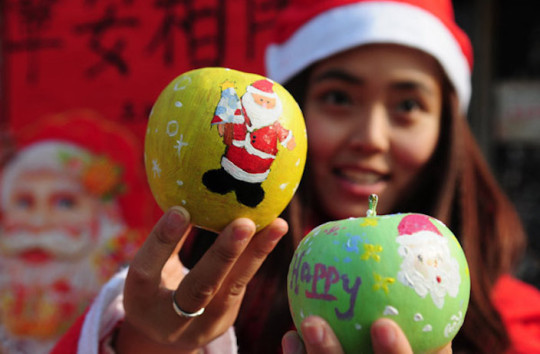
Since not many people in China celebrate Christmas, there are not that many Christmas decorations, but in bigger cities like Beijing, Shanghai, and Hong Kong, you can find places like shopping malls and hotels with beautiful, large Christmas decorations. Some younger generation people have also recently started decorating their homes with small Christmas trees and ornaments. You will probably hear from your Chinese friends that even though they don’t participate much during the Christmas holidays, they really like the Christmas aesthetic and decorations.
The people who do celebrate Christmas in China usually do not celebrate the holiday for religious regions, but because there are at least 44 million practicing Christians in China, there are religious Christmas services held in mainland state churches and in Hong Kong, Macau, and Taiwan.
Places outside of Mainland China (Hong Kong, Taiwan) as well as international schools and embassies do recognize Christmas as an official holiday. Many government buildings, businesses, schools in these places are closed.
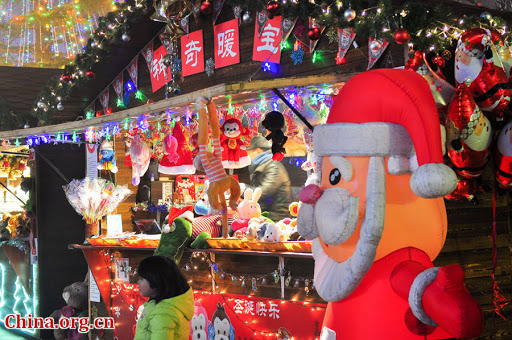
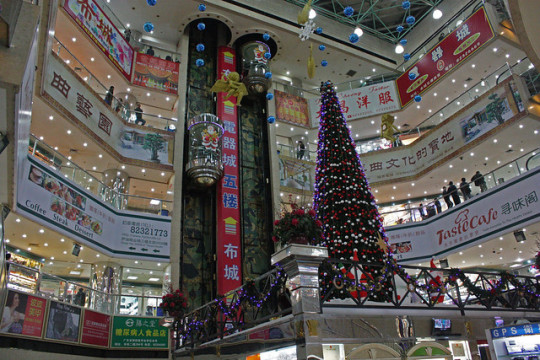
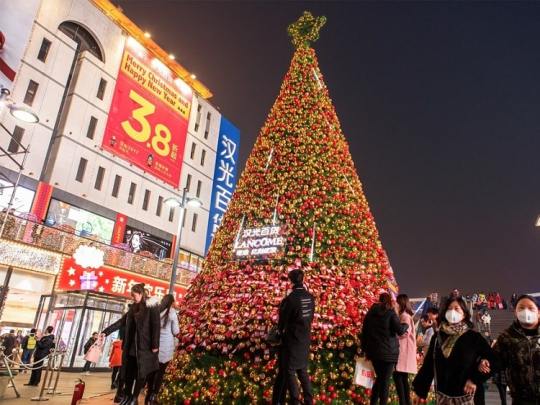
I hope you all have a Merry Christmas, and please stay safe!
- Love, Chinaaesthetic 💕🎁
56 notes
·
View notes
Text
I don’t know who needs to hear this but wearing qipao/cheongsam that’s super short, super tight, has a very high slit up the thigh or sides, and has a large cut-out area in the chest IS offensive.
I know people like to wear revealing and fun costumes during Halloween, which is completely fine, but Halloween is not the time, nor is it ever, to sexualize/appropriate a culture and a traditional dress.
77 notes
·
View notes
Text
Chinese Halloween Vocabulary
大家好!Halloween is tomorrow for the western world, but it is already Halloween in China! Here are some Halloween vocabulary words to know! Happy Halloween, and please stay safe!
万圣节快乐!- Wànshèngjié kuàilè! - Happy Halloween! (translates as “Ten thousand saints festival”)
服装 - Fúzhuāng - costume
面具 - Miànjù - face mask
糖果 - Tángguǒ - candy
不给糖就捣蛋 - Bù gěi táng jiù dǎodàn - trick-or-treat (means “if you don’t give me candy, I will play a trick on you”).
刻南瓜 - Kè nánguā - pumpkin carving
南瓜灯 - Nánguā dēng - Jack-O-Lantern (literally translates as pumpkin lantern or pumpkin light)
鬼故事 - Guǐ gùshì - ghost story
鬼屋 - Guǐwū - haunted house
蜘蛛 - Zhīzhū - spider
黑猫 - Hēi māo - black cat
乌鸦 - Wūyā - crow
蝙蝠 - Biānfú - bat
怪物 - Guàiwù - monster
女巫 - Nǚwū - witch
骷髅 - Kūlóu - skeleton
狼人 - Lángrén - werewolf
科学怪人 - Kēxué guàirén - Frankenstein
恶魔 - Èmó - demon
僵尸 - Jiāngshī - zombie
鬼魂 - Guǐhún - ghost
吸血鬼 - Xīxuèguǐ - vampire
木乃伊, 干尸 - Mùnǎiyī, gānshī - mummy (translates as “preserved body”)
玉米迷宫 - Yùmǐ mígōng - corn maze
恐怖电影 - Kǒngbù diànyǐng - scary movie, horror movie
万圣节晚会 - Wànshèngjié wǎnhuì - Halloween Party
墓碑 - Mùbēi - tombstone
稻草人 - Dàocǎorén - scarecrow
邪恶的 - Xié'è de - evil
幽灵般的 - Yōulíng bān de - spooky
你要打扮成什么? - Nǐ yào dǎbàn chéng shénme? - What are you going to dress up as?
我要打扮成… - Wǒ yào dǎbàn chéng… - I’m going to dress up as...

39 notes
·
View notes
Text
Wuhan Halloween Parade 万圣节快乐!
These are just some pictures from the 2020 Wuhan Halloween Parade today. China doesn’t really celebrate big western holidays like Christmas, Halloween, Thanksgiving, etc, but you are more likely to find people celebrating these holidays in the bigger cities like Beijing, Shanghai, Guangzhou, Shenzhen, Tianjin, etc.
China also celebrates holidays that are equivalent to the western holidays. For example, Americans celebrate Halloween, but China also celebrates Ghost Day. Ghost Day/Ghost Month/Ghost festival is on the 15th day of the seventh month in the Chinese Lunar Calendar. This Holiday is mostly the same as Halloween or Dia De Los Muertos - ghosts, sprits, and ancestors are free to come down into the Earth/Human realm and roam the earth, and families offer food and drinks to the spirits.
Though in these pictures, Wuhan is celebrating Halloween, and thousands of people showed up! As more of the western culture spreads throughout China, more people are beginning to celebrate Halloween and Christmas. People made scary-looking floats, played music, and dressed up in costumes (like nurses, zombies, animals, skeletons, Chinese-traditional inspired Halloween costumes, etc). The use of candy and jack-o-lanterns were also posted on Chinese social media by many people.
Of course there is concern about the Coronavirus, but China is mostly back to normal now, and many people at the parade took plenty of safety precautions and wore masks.
Pictures are from NYPost and DailyMail.
万圣节快乐!
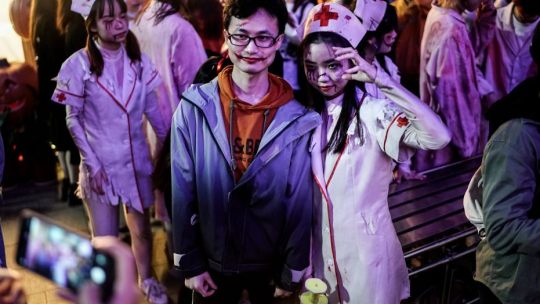
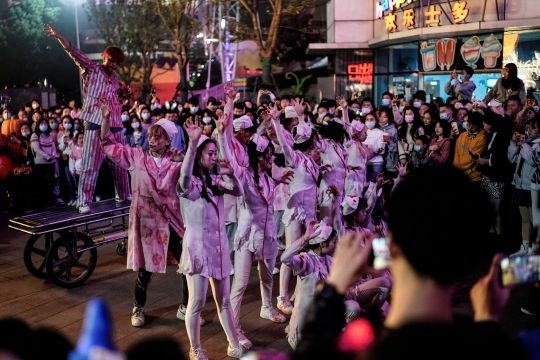
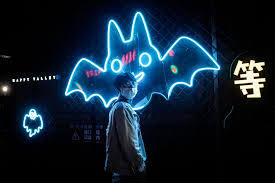
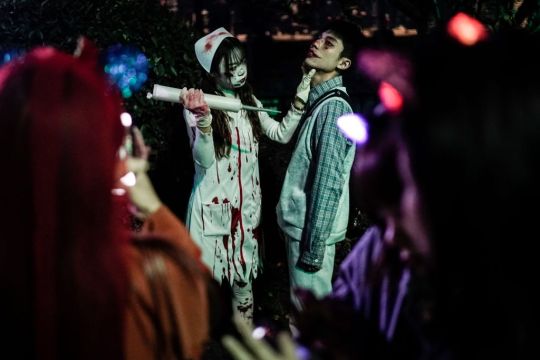
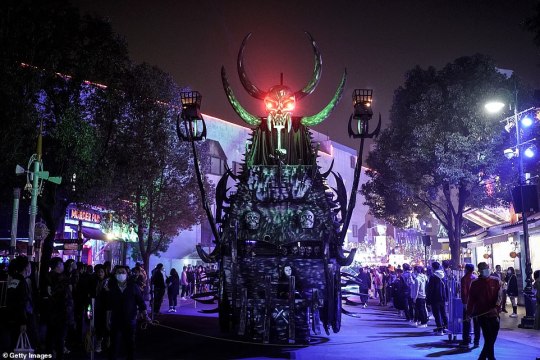

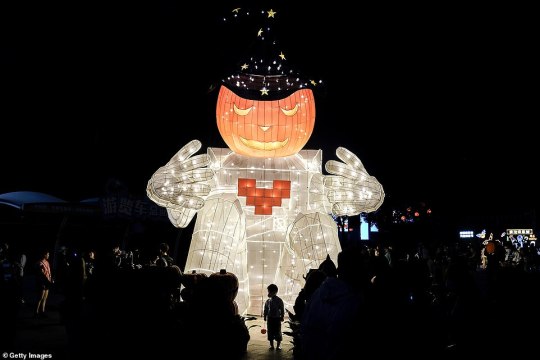
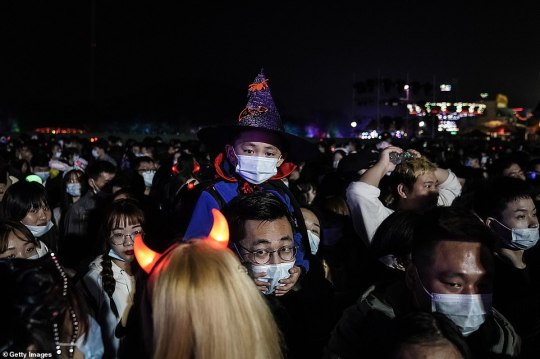
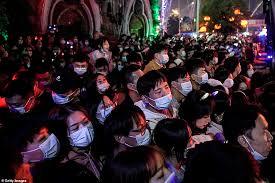
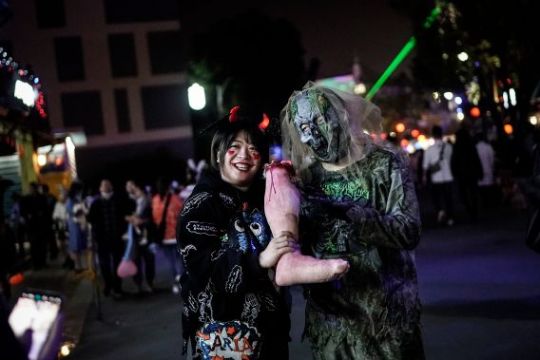
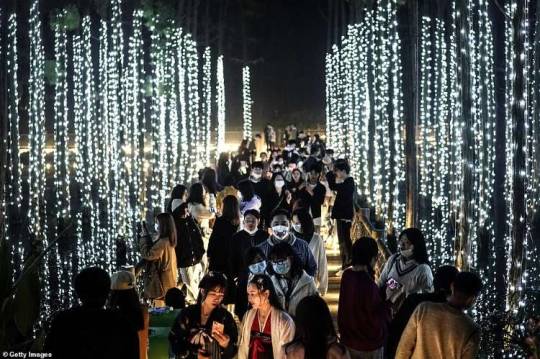
36 notes
·
View notes
Text
Pictures of dogs needed! Please read!
Hello ~ this is chinaaesthetic. Before I start posting again, I want to ask for a huge favor!
I am teaching English to a Chinese girl who just this year moved from China to the US. As you guessed, it has been very hard for her to make this huge adjustment (with the coronavirus rampant, racism towards Asians, trying to learn English, etc). Another hard thing is that she has had to evacuate due to the fires in California.
As of right now, I am teaching her about Halloween so that she can get to know western culture... and she absolutely loves it - she can’t wait for the day when she can safely go trick-or-treating and dress up in neat costumes! (To make it more fun, I always wear a costume during the English lesson). This girl also loves loves LOVES dogs!!! Every time I teach her a new adjective or vocabulary word, she always tries to come up with an example sentence that has a dog in it. She has also told me stories of her begging her parents for a dog.
Anyway, I know that she has been stressed out (with the fires, starting school in a new country), so I want to surprise her! If any of you could send me pictures of your dogs in a Halloween costume, that would be so great! I just want to do something for her that will make her smile and remind her of good things during this time! Your dog size or type doesn’t matter - she loves all of them - and if you want to send me a picture of your dog without a costume, that is also fine! Please send them no later than Halloween!
Thank you guys so much! 非常感谢你!
49 notes
·
View notes
Text
THEY STILL MAKE THESE?! WOW! Thank you @bubbleteakoala!!!!!!!!!!! 非常感谢你 ♡♡♡♡♡♡
Cool Chinese Thing #1
大家好!我今天会教你!
Today, I am teaching you about an interesting Chinese treat from my childhood.
It is a green jelly popsicle called 绿舌头!
It might sound normal, but it looks crazy!

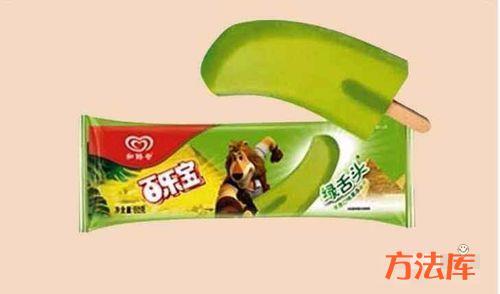
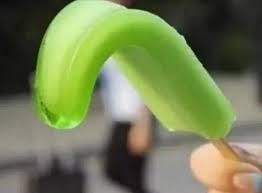
Looks kind of like a tongue, right?
These were very good, and they made funny commercials with this product.
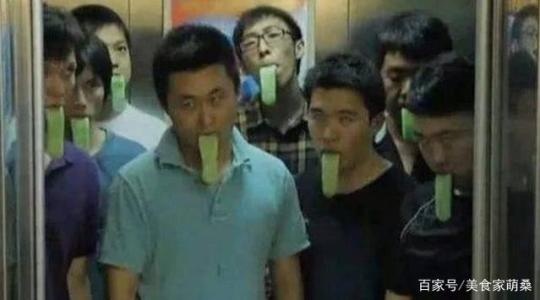
However, I’m not sure if they make them anymore. I haven’t seen any in the last few years.
But they’re certainly memorable! 好吃!
40 notes
·
View notes
Note
hello! is your blog open to all ethnic groups from china? i know that this blog is han-focused, but i was wondering if some of your followers who are from ethnic groups from china can give some insights of diverse cultures in china? i'm sorry if my ask is confusing, but you know what i mean ^^ ty!
您好!Thank you for asking!
Of course my blog is open to all ethnic groups in China! This blog is han and mandarin focused, but I am definitely not going to shy away from other ethnic groups that have shaped Chinese culture and history. I want people to feel proud of who they are and their culture. Though I haven’t made a post about it, I will be happy to make a post about other ethnic groups and cultures in China if it will help you. To my followers who are from other ethnic groups in China, please send me an ask with info from your culture that I can post on my blog to help this anon. Thank you for bringing attention to this, anon! 再见!
Some facts:
Han is the largest ethnic group in China (over 1.2 billion people).
Over 70% of the population in China speaks Mandarin.
There are 55 ethnic groups in China.
4 notes
·
View notes